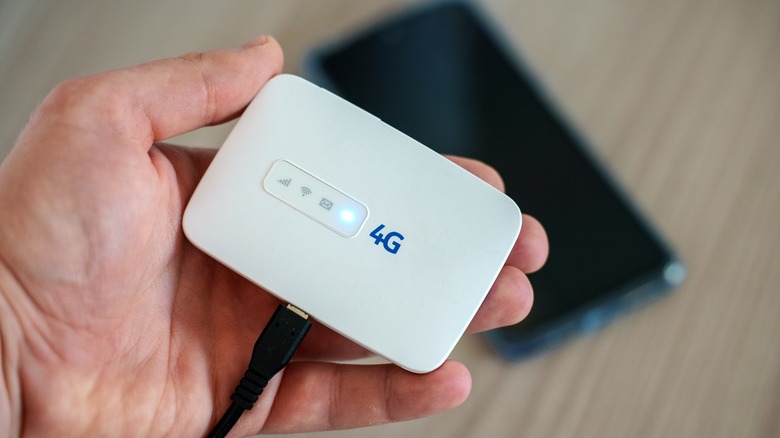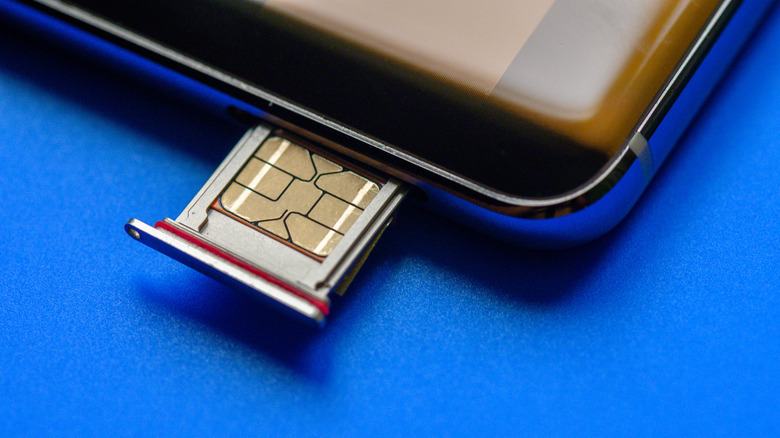Expert-Backed Tips To Get Secure Wi-Fi While Traveling
It's not just your luggage that needs enhanced protection when you're traveling. Your laptop, tablet, smartphone, and the data housed in them deserve more love from you, too. Unless you want malicious entities to get ahold of your pertinent information, it's crucial that you take the necessary precautions to safeguard them. As noted by the FBI, one of the easiest ways to compromise your data is by connecting to a public Wi-Fi network, like those found in hotels and airports.
The agency highlighted that connecting these networks is risky, providing hackers an opportunity to pilfer your passwords or remotely infiltrate your devices. But in cases where you're left with no choice but to use them, one surefire way to safeguard your data is through using a Virtual Private Network (VPN) service. VPNs reroute your traffic to a different server to make it appear as if you're connecting from another location. They also conceal your digital activity by making it indecipherable to prying eyes.
Be smart about choosing a VPN, however, with the FBI advising only the use of those that are well-regarded by users and experts alike, and that promise not to keep a record of any of your information. While free VPN options might be tempting, it's often safer to invest in a paid service. More often than not, free VPN providers discreetly harvest your data and sell it to companies in return for their "free" service.
Rent or buy a portable hotspot
For peace of mind during your travels, consider renting or purchasing a portable hotspot instead. Also referred to as pocket Wi-Fi, it's a compact device that draws data from a cellular network and delivers wireless internet access to whatever device is connected. Instead of repeatedly scrambling to find a place that offers Wi-Fi throughout your trip, a portable hotspot can provide you with a consistent, secure connection. The best part is the connection is yours alone — unless you choose to share the hotspot with other people, of course.
"Portable hot spots will use data just like cell phones do, and coverage will depend on the carrier and the coverage they offer in that area," mobile expert Thomas Walker told CNN. "Since hot spots require data, they also require a plan, something to remember as you consider buying a portable hot spot. For example, if you're in an area that has less coverage, you might see slower speeds on the connected devices."
If you decide to rent, be prepared to pay around $10 a day, depending on the plan you choose. You can pick up and drop them off at airports, or bring one from home, making renting a convenient option. Conversely, if you choose to buy, you can expect to pay upwards of $100 for a decent device. Just be sure that it's not tied to a carrier so you can load it with a local SIM card once you get to your destination if you're heading overseas.
Or get a local SIM card and turn your device into a hotspot
If you can't be bothered to rent or buy a portable hotspot, another option to get reliable Wi-Fi is to use your phone and be your own hotspot. You've likely already done this when the Wi-Fi at a cafe near your home doesn't work as promised, so doing it when you're traveling should be easy. The FBI acknowledges that this method is more secure, and it's as simple as tinkering with your device's settings and enabling the mobile tethering setting. What's more, if your phone is connected to a 5G network, you're likely benefitting from 256-bit AES encryption, one of the strongest digital protections you can get.
For domestic travel, using your phone as a hotspot often incurs no extra charges, though it's wise to confirm this with your mobile carrier. It's a different story, however, if you're traveling abroad. Unless you want to be surprised with a hefty bill when you return, it's better to purchase a local SIM card. Travel guru Rick Steves points out that in many cases, particularly in Europe, getting a local SIM comes out much cheaper than sticking with your carrier, even if you subscribe to travel passes or international data plans. You're often afforded local rates, and you get to enjoy greater control over your data usage and expenses.


